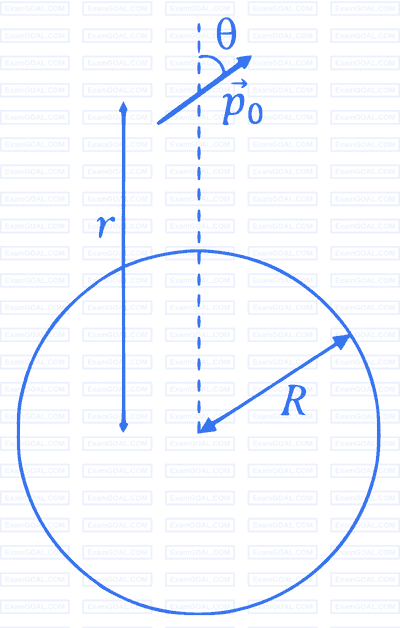
A thin stiff insulated metal wire is bent into a circular loop with its two ends extending tangentially from the same point of the loop. The wire loop has mass $m$ and radius $r$ and it is in a uniform vertical magnetic field $B_0$, as shown in the figure. Initially, it hangs vertically downwards, because of acceleration due to gravity $g$, on two conducting supports at $\mathrm{P}$ and $\mathrm{Q}$. When a current $I$ is passed through the loop, the loop turns about the line $\mathrm{PQ}$ by an angle $\theta$ given by


A small electric dipole $\vec{p}_0$, having a moment of inertia $I$ about its center, is kept at a distance $r$ from the center of a spherical shell of radius $R$. The surface charge density $\sigma$ is uniformly distributed on the spherical shell. The dipole is initially oriented at a small angle $\theta$ as shown in the figure. While staying at a distance $r$, the dipole is free to rotate about its center.

If released from rest, then which of the following statement(s) is(are) correct?
[ $\varepsilon_0$ is the permittivity of free space.]

A table tennis ball has radius $(3 / 2) \times 10^{-2} \mathrm{~m}$ and mass $(22 / 7) \times 10^{-3} \mathrm{~kg}$. It is slowly pushed down into a swimming pool to a depth of $d=0.7 \mathrm{~m}$ below the water surface and then released from rest. It emerges from the water surface at speed $v$, without getting wet, and rises up to a height $H$. Which of the following option(s) is(are) correct?
[Given: $\pi=22 / 7, g=10 \mathrm{~m} \mathrm{~s}^{-2}$, density of water $=1 \times 10^3 \mathrm{~kg} \mathrm{~m}^{-3}$, viscosity of water $=1 \times 10^{-3} \mathrm{~Pa}$-s.]

A positive, singly ionized atom of mass number $A_{\mathrm{M}}$ is accelerated from rest by the voltage $192 \mathrm{~V}$. Thereafter, it enters a rectangular region of width $w$ with magnetic field $\vec{B}_0=0.1 \hat{k}$ Tesla, as shown in the figure. The ion finally hits a detector at the distance $x$ below its starting trajectory.
[Given: Mass of neutron/proton $=(5 / 3) \times 10^{-27} \mathrm{~kg}$, charge of the electron $=1.6 \times 10^{-19} \mathrm{C}$.]

Which of the following option(s) is(are) correct?